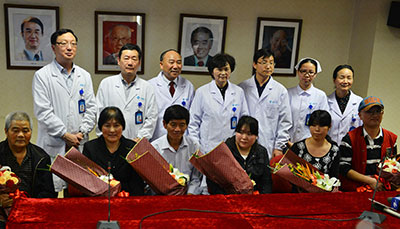Almost two months have passed since President Xi Jinping took office. Despite expectations for greater transparency, Beijing continues to try to suppress information on a broad range of issues from human rights to public health.
Most recently, Sun Lin, a reporter for the U.S.-based Chinese-language news site Boxun, was detained after he filmed and circulated footage of a campaign in support of a dissident’s daughter who was forced out of her school in Hefei city in February. The campaign gained national attention through Chinese social media sites.
Guangzhou-based lawyer Sui Muqing told Radio Free Asia that police accused Sun of “blowing up” the campaign and that his footage had “created a bad impression overseas.” Sun was not told of any charges, nor was his family informed about his detention. The lawyer also said Sun had been beaten while in police custody. Sun was released on April 27, according to news reports.
No doubt also with “creating a bad impression” in mind, authorities last month sentenced four Tibetans to varying prison terms for sharing photographs and other information with contacts outside Tibet in connection with ongoing self-immolation protests. The four men–identified as Choepa Gyal, Chagthar, Namkha Jam, and Gonpo–were convicted on charges of “inciting separatism,” according to the India-based Tibetan Centre for Human Rights and Democracy.
And as China’s new leadership was transitioning to power, authorities forced reporter Li Yuanlong to take a “vacation” to an undisclosed location–a method commonly used to silence critics–after he exposed the story of five dead homeless children found in a dumpster in November. Li returned home a few days later, but said he faced pressure not to speak, according to news reports.
While the government’s relative transparency regarding the latest outbreak of bird flu is promising–particularly in comparison to former President Hu Jintao’s mute approach to the SARS epidemic a decade ago–it is troubling that authorities waited 20 days to release information on the outbreak, according to Isabel Hilton, founder and editor of chinadialogue.net.
A media directive issued by the Central Propaganda Department after 15,000 dead pigs were found floating in the Huangpu River gives some insight into official thinking. As translated by our colleagues at China Digital Times:
The Shanghai Huangpu River dead pig incident is already being dealt with effectively. Related follow-up coverage should follow Xinhua wire copy and information issued by authoritative local departments. The media are not to send journalists to Jiaxing or similar locations to investigate, nor to sensationalize or comment on the issue. (March 19, 2013)
Once again, it’s clear that making the right impression is more important than independent information.
